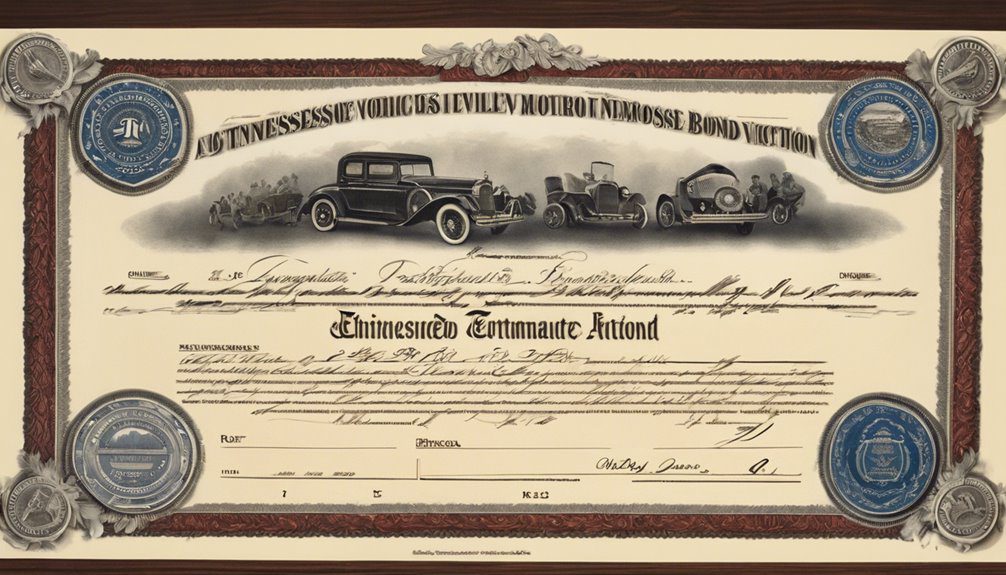If you're considering entering the Tennessee motor vehicle auction market, understanding the Motor Vehicle Auction Bond is essential. This surety bond not only ensures compliance with state regulations but also protects both buyers and sellers from potential fraud. The bond is typically set at around $25,000, which raises questions about its importance and the steps necessary to obtain it. You might be wondering what happens if you don't maintain this bond or how it impacts your auctioneer's license—these are critical aspects that could influence your business operations significantly.
What Is a Motor Vehicle Auction Bond?

A motor vehicle auction bond is a type of surety bond that ensures compliance with state regulations for auctioneers who sell vehicles. If you're planning to operate as an auctioneer in Tennessee, you'll need this bond to legally conduct your business. This bond acts as a guarantee that you'll adhere to state laws governing vehicle sales.
When you obtain the bond, you're essentially promising to follow the rules laid out by the state. Should you fail to comply, the bond protects consumers by providing a financial safety net. This means that if a dispute arises or if you engage in fraudulent activities, affected parties can file a claim against your bond to recover their losses.
Typically, the bond amount varies based on state requirements, so it's essential to check the specific regulations in Tennessee. To secure a motor vehicle auction bond, you'll need to go through an underwriting process, which may involve a credit check and financial assessment. Auto dealer bonds are crucial for promoting fair practices in the automotive industry and protecting consumers.
Once issued, the bond remains in effect for a specified term, usually one year, after which you'll need to renew it to continue your operations legally.
Importance of the Auction Bond
Understanding the importance of a motor vehicle auction bond is crucial for anyone looking to operate as an auctioneer in Tennessee. This bond protects both you and your clients, ensuring that you adhere to state regulations and operate fairly. By obtaining the bond, you demonstrate your commitment to ethical practices, which can enhance your reputation in the industry.
Moreover, the bond acts as a safety net for your clients. If you fail to fulfill your obligations or engage in fraudulent activities, the bond provides financial recourse for those affected. This assurance can help you attract more clients and win their trust, ultimately boosting your business.
In addition, having a motor vehicle auction bond is often a prerequisite for obtaining the necessary licenses to operate. Without it, you may find it difficult to navigate the licensing process, potentially stalling your business plans. Furthermore, obtaining this bond ensures compliance with state bonding regulations, which is essential for maintaining your operational license and credibility in the field.
Legal Requirements in Tennessee

When it comes to operating as a motor vehicle auctioneer in Tennessee, you'll need to meet specific legal requirements to ensure compliance with state regulations.
First, you must obtain a valid auctioneer license from the Tennessee Auctioneer Commission. This includes completing the required pre-licensing education, which typically involves a certain number of hours in auction-related courses.
Next, you'll need to apply for a motor vehicle auctioneer license specifically, which has its own set of criteria. This includes providing proof of your bond, as well as meeting any additional requirements set forth by the state.
Additionally, you must comply with local business regulations, such as registering your business and obtaining any necessary permits.
It's also vital to maintain accurate records of all vehicle transactions, as the state may require documentation for audits or investigations.
Lastly, be aware of ongoing obligations, such as renewing your license and bond periodically. Private investigator bonds are an essential part of ensuring financial protection for clients in the industry.
Staying informed about changes in laws and regulations is crucial to maintaining your status as a compliant motor vehicle auctioneer in Tennessee.
How to Obtain the Bond
To operate as a motor vehicle auctioneer in Tennessee, securing a motor vehicle auction bond is a key step in the licensing process.
First, you'll need to gather the necessary documents, including your business license and personal identification. Then, research and find a surety company that offers motor vehicle auction bonds. It's essential to choose a reputable provider to ensure a smooth bonding experience.
Once you've selected a surety company, you'll need to fill out an application. This application typically requires information about your business, financial history, and any relevant licenses. Be prepared to provide additional documentation as requested, such as credit reports or financial statements, as these factors can influence your bonding eligibility.
After submitting your application, the surety company will evaluate your information. They may ask for clarification or further details.
If you meet their criteria, you'll receive a quote for the bond premium, which is the cost required to secure the bond. Once you agree to the terms and pay the premium, the surety will issue your bond, allowing you to proceed with your motor vehicle auctioneer license application. Additionally, it's important to understand that surety bonds in Illinois are regulated by the Illinois Department of Financial and Professional Regulation, which ensures compliance and protection against potential losses.
Bond Amount and Costs

How much should you expect to pay for a motor vehicle auction bond in Tennessee? The bond amount usually depends on the value of the vehicles you plan to auction. Typically, the required bond amount is $25,000, but it can vary based on your specific license requirements or any additional regulations in your locality.
When it comes to costs, you won't pay the full bond amount upfront. Instead, you'll pay a premium, which is a percentage of the bond amount. This premium usually ranges from 1% to 10%, depending on your credit score and financial history. For example, if your premium is set at 2%, you'd pay $500 for a $25,000 bond.
Keep in mind that other factors can influence your bond rate, including your experience in the industry, the number of vehicles you plan to auction, and any prior claims against you. License and permit bonds serve as guarantees to protect the public and ensure compliance with laws and regulations for licensed businesses.
It's always a good idea to shop around and get quotes from different surety bond companies to find the best rate. Make sure you understand all the costs involved before committing to a bond provider.
Maintaining Your Bond
Maintaining your motor vehicle auction bond is vital for ensuring compliance with state regulations and protecting your business. To keep your bond in good standing, you need to stay aware of the specific requirements set by the state of Tennessee. This includes ensuring that you meet all licensing and operational guidelines for your auction business.
Regularly review the terms of your bond, as well as any changes in state laws that may affect your obligations. It's essential to renew your bond on time, as failing to do so can lead to complications and potential penalties.
Make sure to work closely with your surety company to understand the renewal process and any necessary documentation.
Additionally, keep track of your business practices to avoid any claims against your bond. If a claim does arise, address it immediately to minimize potential impacts on your bond status.
Regularly educate yourself about best practices in the auction industry to enhance your business reputation and reduce risks. Understanding the importance of compliance is crucial for maintaining the integrity of your auctioneer bond.
Consequences of Non-Compliance

Failure to comply with Tennessee's motor vehicle auction bond requirements can lead to significant repercussions for your business. If you don't maintain an active bond, you risk losing your auction license, which can halt your operations and limit your ability to conduct business legally.
The state might impose hefty fines, and these financial penalties can quickly add up, straining your resources.
Furthermore, failure to comply can damage your reputation in the industry. Buyers and sellers might lose trust in your operations, affecting your customer base and future transactions.
You could also face legal action from individuals who feel wronged by your non-compliance, leading to potential lawsuits that could drain your time and finances.
If your bond provider finds you in violation of the terms, they may cancel your bond, further complicating your ability to operate.
In the end, the consequences of non-compliance can ripple through your business, impacting not just your finances, but your credibility as well. Compliance with bonding requirements is essential to foster ethical practices and protect your business interests.
It's crucial to stay informed and ensure you're meeting all bond requirements to avoid these pitfalls.
Conclusion
In conclusion, securing your Tennessee Motor Vehicle Auction Bond is vital for your auctioneer career. It not only protects consumers but also boosts your credibility in the industry. By understanding the legal requirements and keeping your bond active, you're ensuring compliance and fostering trust with buyers and sellers alike. Don't overlook the importance of maintaining this bond—it's essential for your business's success and reputation. Stay informed and proactive to thrive in the auction world!

